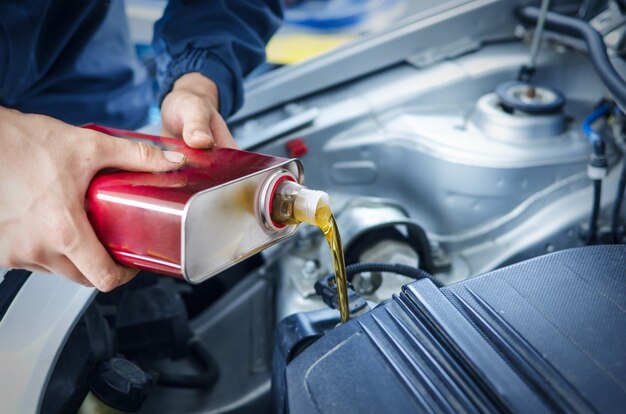
Your vehicle's engine is the beating heart of your daily adventures, and keeping it in optimal condition is essential for a smooth and reliable ride. One of the simplest yet most impactful ways to care for your engine is through regular oil changes. This comprehensive guide will dive into the why, when, and how of engine oil changes, ensuring your vehicle runs as smoothly as the oil.
The Importance of Engine Oil
Imagine engine oil as the lifeblood of your vehicle's engine, keeping all the moving parts lubricated and working seamlessly. Over time, oil can break down, lose its viscosity, and become contaminated with debris. This can compromise the engine's performance and, if neglected, lead to costly repairs. Regular oil changes are the key to maintaining engine health and longevity.
When to Change Your Engine Oil
The age-old question: how often should you change your engine oil? While the traditional advice was every 3,000 miles, modern vehicles and advancements in oil technology have extended this interval for many cars. Refer to your vehicle's owner's manual for manufacturer recommendations, which typically range from 5,000 to 7,500 miles.
However, certain factors can accelerate the need for an oil change
1. Driving Conditions: If you frequently drive in stop-and-go traffic, tow heavy loads, or endure extreme weather conditions, your engine works harder, requiring more frequent oil changes.
2. Age of the Oil: Even if you have not hit the mileage limit, engine oil deteriorates over time. Consider changing the oil annually if your vehicle sits idle for extended periods.
3. Warning Lights: Modern vehicles come equipped with oil change indicators. If your dashboard signals that it's time for a change, don't delay.
Choosing the Right Engine Oil
Selecting the appropriate engine oil is crucial for optimal performance. Here's what you need to consider:
1. Viscosity: This indicates the oil's thickness. Engines have specific viscosity requirements, so consult your manual to ensure you use the right type.
2. Oil Type: There are various oil types, including conventional, synthetic, and blends. Synthetic oils often offer enhanced performance and protection, especially in extreme conditions.
3. Certifications: Look for oils that meet industry standards and carry certifications like the American Petroleum Institute (API) symbol. This ensures the oil has undergone testing for quality and performance.
DIY vs. Professional Oil Changes
Changing your engine oil can be a DIY task for those with the necessary skills and tools. If you're comfortable getting under the hood, here's an essential guide:
1. Gather Supplies: You'll need oil, a new oil filter, a wrench, a jack, and a drain pan.
2. Drain the Old Oil: Locate the oil drain plug, place the drain pan beneath, and remove the plug. Let the oil drain completely.
3. Replace the Oil Filter: Unscrew the old oil filter, lubricate the rubber gasket on the new one with oil, and install it hand-tight.
4. Refill with New Oil: Consult your manual for the correct oil capacity and pour in the new oil.
5. Dispose of Old Oil: Properly dispose of the used oil at a recycling center.
While DIY can be satisfying, many prefer professional oil changes for convenience and to ensure the job is done right. Automotive service centers have the expertise and equipment to handle the process efficiently.
Benefits of Regular Oil Changes
1. Engine Protection: Clean and fresh oil provides a protective barrier against friction and heat, preventing premature engine wear.
2. Improved Fuel Efficiency: A well-lubricated engine operates more efficiently, contributing to better fuel economy.
3. Enhanced Performance: Regular oil changes keep your engine running smoothly, ensuring optimal power and performance.
4. Extended Engine Life: Consistent care through oil changes can significantly extend the life of your engine.
Your vehicle's engine is a marvel of engineering; maintaining it doesn't have to be complicated. Regular oil changes are a small investment that pays significant dividends in performance, longevity, and overall reliability. Whether you choose the DIY route or entrust the task to professionals, prioritize this essential aspect of vehicle maintenance. After all, a well-lubricated engine is a happy engine, which makes for a smooth and enjoyable ride.